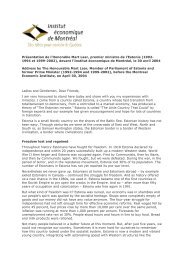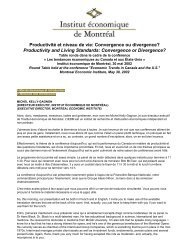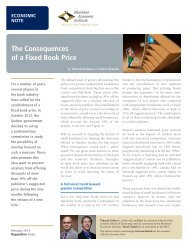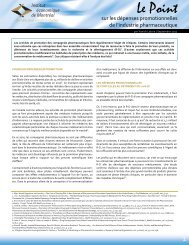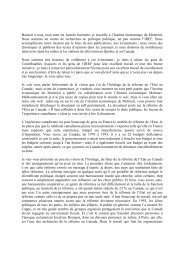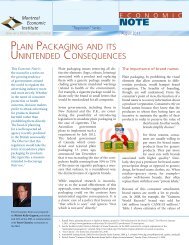Publication (PDF format) - Institut économique de Montréal
Publication (PDF format) - Institut économique de Montréal
Publication (PDF format) - Institut économique de Montréal
You also want an ePaper? Increase the reach of your titles
YUMPU automatically turns print PDFs into web optimized ePapers that Google loves.
Why New International Taxes for Development Are Inefficientsupposed to pay for (health programs in <strong>de</strong>velopingcountries), making the whole process as obscure asit can be.Much the same can also be said for theproposed solidarity tobacco contribution. FTTsand carbon taxes may also end up hid<strong>de</strong>n in theprice consumers pay for goods and services—in theprice of goods shipped by sea, for instance. It is truehowever that in the case of carbon taxes, there is arelation between what they tax and the services theyare <strong>de</strong>emed to ren<strong>de</strong>r (environmental protection)to the extent of course that the tax revenues wouldnot serve to pay for other sorts of <strong>de</strong>velopmentactivities. As for SDR issuance, it would be amongthe most obscure of taxes.For these reasons, we consi<strong>de</strong>r that IFD’s successin meeting the political responsibility criterion is“mostly poor” in virtually all cases, as indicated inChart 4. The qualifier “mostly” recognizes that aneasily-i<strong>de</strong>ntifiable government remains responsiblefor them, even if most taxpayers do not know thatthese taxes exist or what they serve to finance. SDRissuance especially would be <strong>de</strong>eply hid<strong>de</strong>n andclearly constitute a poor tax in view of the politicalresponsibility criterion.2.6 Fairness and Tax Inci<strong>de</strong>nceThe fifth criterion of a good tax accordingto standard public finance is fairness. As alreadysuggested, one problem is <strong>de</strong>termining whatfairness or equal treatment means. The implicitnotion of fairness in official discussions of IFDtaxes seems to be concomitant with progressivityof taxation and redistribution from rich to poor.As this implicit notion also dominates standardpublic finance discussions, we may adopt it for thepurpose of evaluating IFD taxes.The problem, however, is to find out whoactually pays a tax or, in economic terms, tocalculate its inci<strong>de</strong>nce. Ultimately, all taxes arepaid by physical individuals, whether they beconsumers, workers or sharehol<strong>de</strong>rs. The theory oftax inci<strong>de</strong>nce shows that a tax is often not paid, orat least not fully paid, by the individuals or entitiesagainst whom it is assessed.For example, indirect taxes on goods arenormally shared between suppliers and consumers,whether they are nominally charged to the buyeror to the seller. 86 To see this, suppose a tax is leviedagainst suppliers. Since their marginal cost hasincreased, they will reduce their quantity supplied.Quantity <strong>de</strong>man<strong>de</strong>d is now higher than quantitysupplied, and the price will be bid up by customers,which is just another way of saying that supplierswill realize that they can charge more. As the priceincreases, customers end up effectively paying partof the tax. The exact shares paid by suppliers andconsumers <strong>de</strong>pend on the elasticity of <strong>de</strong>mand andthe elasticity of supply. 87And this is only the first part of the story. Ifconsumers hit by a tax can import the good fromother countries (legally or illegally), they will, ina second step, reduce their domestic purchases,eventually leading to lower wages in the relevantdomestic industry. Because of these shifts, it oftenhappens that salaried employees end up supportingmost domestic taxes, including corporate taxes;they are the least mobile factor of production, andso the tax buck stops there. 88Consi<strong>de</strong>red in this light, IFD taxes may very wellbe regressive. Despite UNITAID’s undocumentedclaim that the FTT would be paid by the rich, 89Thornton Matheson, an economist with the IMF,persuasively argues that it would, in the long run,fall on employees or consumers as investors wouldreduce their investments in financial firms (so thatthe rate of return in the industry would remain thesame). 90 Carbon taxes don’t fare well either on theprogressivity-regressivity criterion, as they wouldultimately be paid either by the consumers of goodsproduced with carbon-related inputs or by theworkers producing these goods. In fact, the IMFadmits that carbon taxes would need complicatedcompensation arrangements in or<strong>de</strong>r not to harmpoor workers in <strong>de</strong>veloping countries (in their86. Musgrave (1959), pp. 287-311; Stiglitz (1988), pp. 411-436. A good,short <strong>de</strong>scription of the problem of tax inci<strong>de</strong>nce can be found in IMF(2011), p. 23.87. The elasticity of supply is analogous to the elasticity of <strong>de</strong>mand; it is<strong>de</strong>fined as the proportional change in quantity supplied that resultsfrom a change in price.88. See Geloso (2010) and the references cited therein.89. UNITAID (2011), p. 10.90. Matheson (2011), pp. 23-26.Montreal Economic <strong>Institut</strong>e 25



